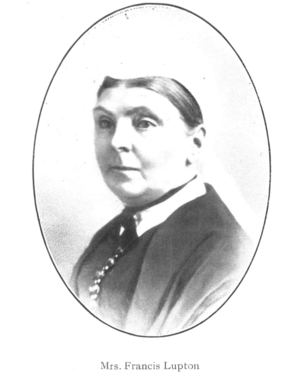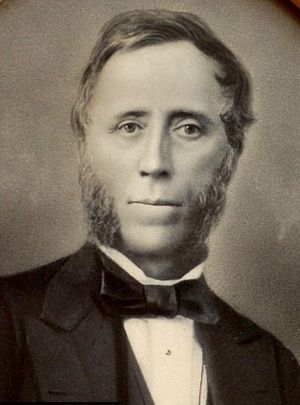Frances Lupton facts for kids
Quick facts for kids
Frances Lupton
|
|
|---|---|
 |
|
| Born |
Frances Elizabeth Greenhow
20 July 1821 Newcastle upon Tyne, England
|
| Died | 9 March 1892 (aged 70) |
| Known for | Female education reform |
| Spouse(s) | Francis Lupton |
Frances Elizabeth Lupton (born Greenhow; 20 July 1821 – 9 March 1892) was an important Englishwoman during the Victorian era. She worked hard to create more school and college opportunities for women. She married into the well-known Lupton family from Leeds. There, she helped start Leeds Girls' High School in 1876. She also represented Leeds on the North of England Council for Promoting the Higher Education of Women.
Contents
Frances Lupton's Early Life
Frances Elizabeth Greenhow was born on 20 July 1821. Her family lived in Newcastle upon Tyne and many of them were doctors.
Her father, Thomas Michael Greenhow, helped start the city's Eye Infirmary. He also helped create the Newcastle University Medical School. He worked at the Newcastle Infirmary for many years. This hospital is now called the Royal Victoria Infirmary.
Her mother, Elizabeth, came from the Martineau family. This family was known for their smart ideas, businesses, and political work. Many of her relatives were Unitarians. This was a branch of English Dissenters, people who did not follow the main Church of England.
Frances grew up in Norwich and went to the Octagon Chapel, Norwich. Her aunt, Harriet Martineau, was a famous writer and social thinker. She is often called the first female sociologist. Her uncle, James Martineau, was a religious philosopher.
Frances went to school at her aunt Rachel Martineau's school. She stayed close to her aunt Harriet as an adult. The Unitarian ideas of being open-minded and helping others stayed with her. These ideas guided her throughout her life.
Marriage and Family Life

In 1847, Frances married Francis Lupton (1813–1884). He was from a rich family in Leeds who made cloth. His family was also very active in politics.
Besides his business, Francis Lupton helped start the Yorkshire College of Science in 1874. This college later became part of the University of Leeds. The Lupton family were also Unitarians. They worshipped at Mill Hill Chapel in Leeds City Square.
Frances married into a family that worked for change. Her husband's brother, Joseph Lupton, fought against slavery. He was also a Liberal politician. He was on the committee for women's right to vote.
Francis and Frances lived near Leeds at Potternewton Hall. Later, they moved to Beechwood, a large Georgian house in Roundhay. Francis worked as a director of his family's wool company. He passed away suddenly in 1884.
The Luptons had five sons. Four of them grew up to help the city of Leeds. Two of them even became Lord Mayor of Leeds. When her brother's wife died, Frances also raised her niece, Mabel Greenhow.
Frances Lupton is the great-great-great-grandmother of Catherine, Princess of Wales. This connection comes through her eldest son, Francis Martineau.
Working for Girls' Education
Why Education for Girls Was Needed
In the mid-1800s, there was a growing need for better education for women. Some girls' schools already existed. For example, Mary Wollstonecraft had a school in the 1780s. Quakers also set up the Newington Academy for Girls in 1824.
However, new colleges started to open for young women. Queen's College, London opened in 1848. It helped women become qualified teachers (governesses). The first girls' schools aiming for university entry were North London Collegiate School (from 1850) and Cheltenham Ladies' College (from 1858).
Important women like Emily Davies and Anne Clough worked for women's higher education. Emily Davies started Girton in 1869. Anne Clough started Newnham in 1871. These colleges were linked to University of Cambridge.
Frances Lupton's aunt, Harriet Martineau, visited the United States in 1834. She was interested in the new girls' schools there. In her book Society in America (1837), she wrote about how girls' education was not good enough. She said that women's minds were limited because they didn't get enough education.
Frances Lupton's Impact on Education
The Oxford Dictionary of National Biography says that Frances Lupton was a pioneer. She greatly helped to expand education for women.
In 1871, Lupton became the Honorary Secretary for the Ladies' Honorary Council of the Yorkshire Board of Education. She was a very strong leader for this group. She also led the Leeds Ladies' Educational Association. One of her first successes was setting up a library for students.
Soon, her committees helped organize the first Cambridge Local Examination for women in Leeds. This was a big step forward.
The biggest need was for good all-round education for girls. This education needed to be as good as what boys received at traditional grammar schools. It was hard to use existing money from old charities. So, Lupton led a meeting to find a new way. Her smart business ideas led to the creation of Leeds Girls' High School in 1876.
Lupton and the Ladies Council also saw the need for practical skills. They wanted to teach subjects like health and nursing. They started a cookery school in 1874. Later, this school developed courses to train teachers. This eventually became part of Leeds Metropolitan University.
In the early 1870s, Lupton invited important educators to her home, Beechwood. These included Anne Clough from Newnham College, Cambridge, and John Robert Seeley from Christ's College, Cambridge.
By 1872, Lupton represented Leeds on the North of England Council for Promoting the Higher Education of Women (NECPHEW). She was also part of the Education for Girls Committee of the Royal Society of Arts. In 1885, Lupton helped set up the Leeds branch of the Association for the Care and Protection of Friendless Girls.
Death
Frances Lupton passed away at her home, Beechwood, on 9 March 1892. She is buried at St John's Church in Roundhay.
 | Delilah Pierce |
 | Gordon Parks |
 | Augusta Savage |
 | Charles Ethan Porter |

